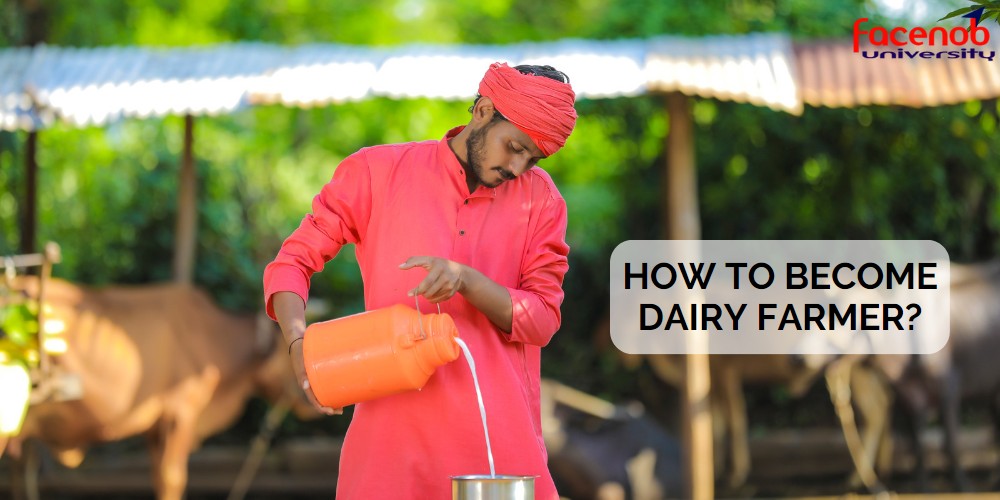How to Become Dairy Farmer?

Introduction of Dairy Farmer
Over six billion people worldwide consume milk and dairy products. If you’re one of them, you owe Dairy Farmers a huge debt for bringing about the white revolution and continuing to help the culinary industry reach new heights.
Also Known As
- Dairy Farm Manager
- Dairy Herd Manager
- Dairy Operations Manager
- Dairy Farm Assistant
- Dairy Farm Owner

Typical Job Responsibilities
What do Dairy Farmers do?
A Dairy Farmer would typically need to:
- Take care of dairy cows to ensure they produce as much milk as possible.
- Ensures that the cows receive their feed, supplements, and vaccinations on time; cares for sick animals
- Dispose of their biological wastes properly and keep the cows’ resting areas clean and hygienic.
- Use special equipment to efficiently milk the cows and pasteurize the milk by government regulations.
- Ensure that the dairy farm and its equipment are clean and well-maintained.
- Collaborate with veterinarians to keep animals healthy and administer necessary vaccinations and treatments.
- After consulting with animal nutritionists and livestock feed sales representatives, create animal feeding plans that result in maximum milk production levels.
- On-farm audits should be scheduled and monitored to ensure herd health and well-being, employee training, and milk quality.
- Follow the government’s and your organization’s safety protocols and hygiene regulations.
- Collaborate with stakeholders such as dairy producers, contractors, dealers, and engineers on relevant projects.
- To ensure a smooth workflow, keep track of farm personnel such as stock managers, herders, parlor managers, and milkers.
- When necessary, deliver or manage the delivery of milk and dairy products to their respective destinations.
- Observe the animals and document their activities for future use.
Standard Work Environment
Dairy farmers are accustomed to working outside in various weather conditions and extreme temperatures. They spend most of their workday on-site, though they may need to travel to other stakeholders’ offices, such as dairy producers, contractors, dealers, and engineers.
Because their job requires them to contact large animals regularly, they must wear protective equipment and follow all safety regulations.
Work Schedule
Dairy farmers typically work more than eight to ten hours daily, seven days a week, including nights and weekends. Their workdays frequently begin before sunrise.
Employers
Finding a new job may appear difficult. Dairy Farmers can improve their job search by soliciting referrals from their network, contacting employers directly, using job search platforms, attending job fairs, and leveraging social media. Working for oneself is a viable option.
Dairy Farmers are generally employed by:
- Large Corporate Companies
- Small Dairy Producers
- Dairy Cooperatives
Unions / Professional Organizations
Professional associations and organizations, such as Global Dairy Farmers, are essential for Dairy Farmers who want to further their professional development or connect with other professionals in their industry or occupation.
Membership in one or more organizations adds value to your resume while strengthening your credentials and qualifications.
Workplace Challenges
- Working outdoors regardless of extreme temperatures and weather conditions
- Dealing with large animals can be threatening to personal safety
- Having to work odd hours like nights and weekends can get frustrating
- Waking up to begin work before dawn each day may get tiring and lead to a lack of social life
Suggested Work Experience
Any academic program that a potential Dairy Farmer pursues, such as an agricultural or agricultural business management apprenticeship, typically requires eighteen months of supervised experience.
Direct, hands-on experience working with dairy cows is essential. When your tasks outside of the classroom perfectly align with your lessons inside, you will get the most out of them. When more experienced professionals turn seemingly routine incidents into unique learning moments, you may hear countless stories from them and gain valuable hands-on experience.
Working as an apprentice in an established dairy farming operation could help you land your first job.
You could also gain the necessary experience by working with youth programs that allow young people interested in the industry to handle various farm animals and compete in livestock shows.
To demonstrate your commitment to course providers and prospective employers read about the profession and interview/job shadow experts in the dairy farming industry.
Recommended Qualifications
A two- or four-year degree in dairy science, agriculture, or animal science is typically required for Dairy Farmers. Typical topics such courses cover include dairy science, anatomy, physiology, reproduction, crop science, farm management, technology, and agricultural marketing.
Students in high school who want to work in the dairy farming industry should study mathematics, accounting, agricultural science, digital technology, and biology.
Certifications, Licenses, and Registration
A Dairy Farmer’s competence in a skill set is demonstrated through work experience, training, and passing an examination.
Voluntary certification in animal resources, dairy cattle nutrition, animal nutrition, animal genetics, or animal welfare science from an objective and reputable organization can help you stand out in a competitive job market and increase your chances of advancement.
A valid driver’s license is usually required for dairy farmers. An application, processing fees, an examination, and relevant education and experience are typically required for licensure.
Projected Career Map
Dairy farmers’ career progression is driven by performance, experience, and the acquisition of professional qualifications. They can choose from a variety of career paths.
Those with a veterinary or agricultural degree can work as Farm Managers or Head Veterinarians.
Dairy farmers who own their businesses can expand them to increase profits. Hired hands on the farm can advance to Farm Manager or start their own dairy farming business.
Job Prospects
Job opportunities are best for candidates with dairy science, agriculture, or animal science degrees.
Beneficial Professional Development
CPD will assist an active Dairy Farmer develop personal skills and proficiency through work-based learning, a professional activity, formal education, or self-directed learning.
Working professionals can improve their work by studying for additional business management qualifications or attending farming discussion groups.
CPD is required for the ongoing renewal of critical certifications and licenses. It enables you to constantly improve your skills, regardless of your age, job, or level of knowledge.
Conclusion
Dairy Farmers overcome enormous and arduous challenges with the strength of their backs and the sweat of their brows to ensure that most of the world’s population does not miss out on an essential component of their daily diet.
Their vital contribution to the world, like the products they supply, often goes unnoticed but is never forgotten.
Advice from the Wise
Give equal priority to money management and on-farm activities.
Explore Also: How to Become Conservation Scientist?
